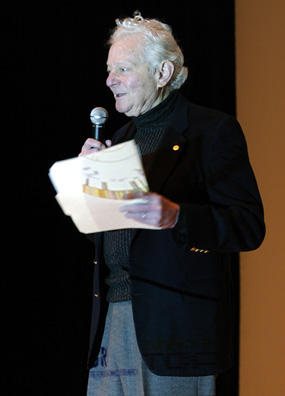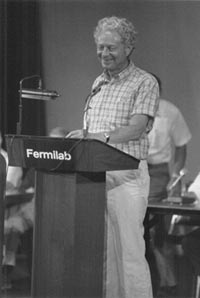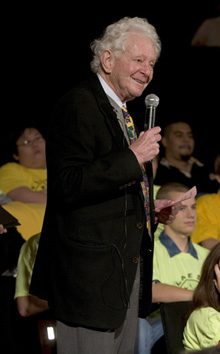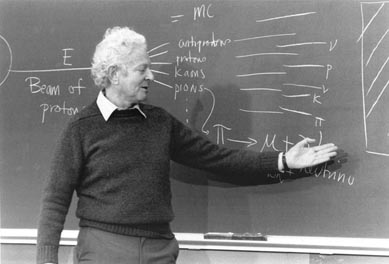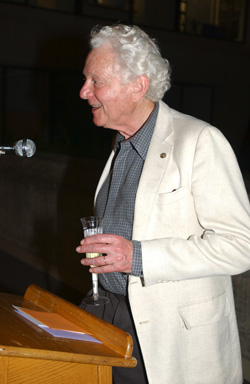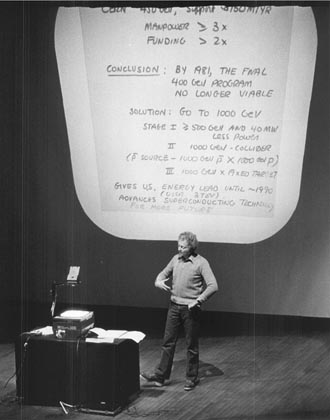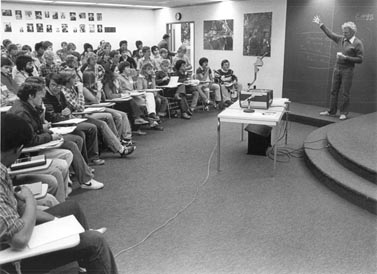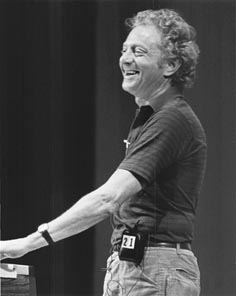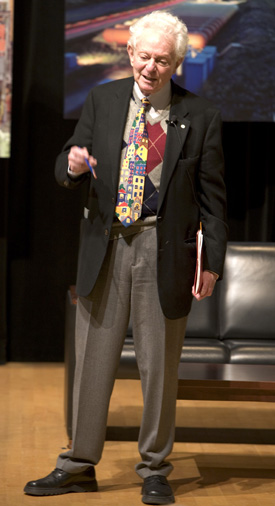The Words of Leon M. Lederman
On Appreciation:
"I got an excellent free education in New York's public schools -- they were good then (1928-39). Then I got a free college education at CCNY. I went to graduate school under the GI Bill. Then when I got my degree, I was handed the finest equipment to do the work I most wanted to do. And now they are giving me a medal. [1965 National Medal of Science] That's really pretty funny."
New York Post, 2/10/66
On winning the Nobel Prize:
"The telephone rang! And I thought, that's probably the Nobel Prize committee calling."
St. Charles Chronicle, 10/21/88
"To me, the most encouraging aspect of an award such as this is that, hopefully, young people will hear about this and be inspired to carry on this most basic type of research. Those are the people who will figure out how to use these tools to solve the problems society faces ... neutrinos are part of the fund of basic knowledge we need to help us cope with, and improve, our future. The SSC is part of a basic-research continuum that stretches back to Galileo and forward through Faraday's experiments with electricity and, in this case, the machine at Brookhaven where we discovered the neutrino. The SSC and the Tevatron are examples of tools which will improve our fundamental knowledge. They and many other scientific tools are needed so as to encourage the young aspirants to science to pitch in and help to advance science across the entire frontier."
FNAL press release, 10/19/88
And on his plans for his winnings:
"I haven't decided whether to buy a castle in Spain or a string of racehorses."
New York Times, 10/20/88
On new ideas and higher energy:
"Since new ideas are always inimical to large projects, we should either decide never to build anything, or to build everything or to suppress all new ideas. This note is not to recommend any of these approaches at this time but to point out that the AGS modification can be used in a relatively simple way (I think) to enable the observation of interactions... corresponding to a laboratory bombarding energy of 110 BeV. This would involve construction of a 1 BeV storage ring intersecting with the modified AGS... This type of ring seems very simple to build... Except for the tricky intersection region, this looks simpler. The system has growth possibilities... The main point now is to make sure the linac injector is of high enough energy and intensity to serve this purpose."
Memo to BNL Big Shots, 3/18/64
On art and physics:
"Physics is the science of observation, and probably no art is closer to the metier of the practitioner than is photography. How parallel are the tasks! Blend respect for meticulous technique with inspiration in order to expose a small piece of the world. Explain through the eye and the mind how a thing subtle but of great wonder can be revealed... It all amounts to a glimpse of the world which is on the one hand abstract, ethereal and evocative of varieties of esthetic reactions. On the other hand there is for us physicists the faith in an underlying rationale of crystalline precision... By this reminder of the essential unity of our fascinations, we may even do better science."
Nojima Yasuzo Exhibit Program, Fermilab Art Gallery, 8-9/79
On culture:
"Why should we have a history of accelerators project? Because it is our culture!"
Warrenville Astronomical Society Dinner Party, 1989
On basic research and economic development:
"Basic research is designed to increase our understanding of the nature of the universe in which we live. It is curiosity-driven, unmotivated by thought of usefulness and hence almost by definition, it is not aimed at economic development. The consequences of basic research are characterized by unpredictability. Research is a venture, literally, into the unknown. Scientists take up basic research out of a sense of pure excitement, out of joy at enhancing human culture, out of awe at the heritage handed down by generations of masters and... out of a need to publish and become famous... The bridge between basic research and economic development is called Technology: i.e. the process of finding ways of doing things which do impact directly on society... It is a signature of the times that these three activities, basic research, technology and economic development are intertwined together, advancing in an ever-increasing spiral. The understanding of these connections is a major task for government, industry, university scholars and citizens whose lives are affected. Here we need all the hope we can get because this combination has indeed changed our lives, continues to change our lives and the prognosis is for an ever-increasing rate of change... Basic scientific research is an investment which society makes in its culture and in its comfort, i.e. its expectation of economic returns. So far, science has more than fulfilled these expectations. But science is not a consumption good to be expanded in good times and restricted in bad times. The doing of science as well as the supporting of science is an expression of faith in the future. It would have been possible to have told Newton and Faraday, Maxwell and Einstein, Bohr and Heisenberg that, given the poverty and squalor around them, their research were luxuries which could not be afforded. To have done so would be to destroy the economic progress that came out of their science and which was the main factor in relieving that poverty and squalor. We seem to be on the verge of saving one percent but sacrificing untold scientific discoveries and their unpredictable economic benefits."
"Basic Research and Economic Development," Governor's Conference on Science and Technology in Illinois, 9/4/86
On the impact of new applications of computers:
"I will talk about the increasing complexity of nonbubble chamber experiments... This complexity is made necessary by the very esoteric and fleeting objects whose properties one is trying to delineate. There is no other way of learning these things. These large complexes are made possible not only by the invention of such devices as spark chambers, but by the widespread introduction of solid state components... permitting the assembly of large analyzer systems of unprecedented reliability. Probably the most dramatic consequence of this is the application of digital computers as prime experimental tools. The power of computing machines in data analysis is an old story dating back to 1960 or so... In the old-fashioned days of last year the [spark chambers, magnets and] counters would provide... the information that yes, perhaps something nice is happening in the spark chambers... Today, and more often tomorrow, the scintillation logic is processed directly by a computing machine, on-line with the experiment... Thus, the growing awareness of computer capabilities is shaping the development of the nonbubble chamber particle detectors. There is an economic rationale: as the complexity and sophistication of the experiments increase, the cost of a general purpose computer, often used only part time on any given experiment, often competes with the cost of the special purpose circuitry required... The time spent by my generation in learning arts and skills of plumbing and electronics will in part give way to acquiring greater familiarity with the programming and computer science. There will be problems. The demand for off-line computing is increasing exponentially. This development will not help. Then too, for university professors, there must be a concern for the training of graduate students in the circumstances of so much automation... A major part of the creative activity in the experimental science has been traditionally devoted to arts and recipes of gadgetry. We have a responsibility to make sure that this goes on if we are to hope for new devices and new breakthroughs. But I believe opportunities will always persist... Another comment involves the educational benefits of this activity. There are several troubles: one is the fact that the student now buys, or has bought for him, much of the equipment he uses and the other is the fact that he is forced by the nature of this research to work in large groups. However, I don't know of any educational experience more exciting and more profound than those students who happen to participate in an experiment that hits or finds something really new at the frontier. I clearly believe the problems raised by the new trend will be manageable but much thought must be given to them... Young students take to programminq very, very quickly. The older professors have the hard time. They have to work at it. IBM at Columbia gives a course called the Fool-proof 3-day Course in Computing, and I failed. (To which Chairman Holifield replied: "Maybe you needed an extra day.")
Testimony in Hearings before the Subcommittee on Research, Development and Radiation of the Joint Committee on Atomic Energy, 2-5 March 1965
On change:
"Why is scientific literacy important?... Science begets technology... Technology begets more science... More science begets more technology... The name of the game is CHANGE."
"Sermon for Science Teachers," The Physics Teacher, September 1986
On choice:
"Time and time again we have been shown that this nation can afford anything it really wants to do. As a simple country physicist, I maintain that a doubling of the research budget and the education initiative at the level of adding $10 billion to $20 billion out of a federal budget of $1.5 trillion or a GNP of $6 trillion is not a matter of funding, it is simply a matter of choice."
1992 AAAS Presidential Address, 2/9/92
On the importance of the search:
"Some of my colleagues believe that the human search for the structure of the universe -- how it came to be and hence how we came to be -- is more important than finding the answer because the search motivates the creative power of the human imagination. Isn't this just what you, the Master Teachers of America, try to do in your day-to-day dealings with your young students?"
"Sermon for Science Teachers," The Physics Teacher, September 1986
On after-dinner speeches:
"When asked to be the after dinner speaker I asked, 'Why do you want to spoil the dinner?'... I did a small computer calculation and discovered that at this moment there are 972 after dinner speakers on their feet talking! That's only in the US... Somewhere in this great land, where banquet speeches echo from sea to shining sea, there are educators who stand in this place. These fellows have chutzpah... they blithely assert that all the problems... can be solved if only we'd do a better job in education. Some banquet speaker is sure to point out that we... [are] the world's leading debtor nation! Can we continue to be a world leader, leading all those nations to whom we are in hock for by what is estimated to be $500 billion? Of course the Japanese are the leading culprits. Just think - if they had won the war, we'd all be forced to drive Toyotas and watch TV on Sonys!!!"
"Science, Culture and the American Dream," Chicago High Technology Association, 10/14/87
On Enrico Fermi, particle physics, cosmology, and the Supercollider:
"The SuperCollider, that we hope will be complete in 1996 or so... is designed to overcome the most baffling obstacles to progress in the combined fields of particle physics and cosmology... Enrico Fermi, much beloved in this neighborhood, described the practitioners of this field as high priests -- and today the high priests must descend from the temple, they must immerse themselves in this very imperfect world. The bloody SSC costs $4 billion so wo have to get involved in the federal budget deficit and the balance of trade and the transcendental goodness of Mikhail Gorbachev, not to mention the chairmen of relevant Appropriation Committees."
"Science, Culture and the American Dream," Chicago High Technology Association, 10/14/87
On the future:
"...in a civilized society, the future should be an ally -- it should hold forth the promise of longevity, freedom from disease, enriching leisure, dignity and fulfillment: The American Dream!... science and technology with wisdom can bring these things to be, can serve to brighten the future and it isn't that expensive, not $1 billion a day, at least as now perceived, but a few billion a year."
"Science, Culture and the American Dream," Chicago High Technology Association, 10/14/87
On science and education funding:
"Might we not have $1 billion a day? What would this do for us? The mind boggles!... A truly educated citizenry would enjoy fruitful leisure and participate in the choices the nation makes in determining the shape of its future. And in the sense of a quiet Japanese garden, the commitment to our ancient cultural heritage of striving to understand how and why? Why us? may perhaps lead to a recognition of the deeper meaning of our existence."
"Science, Culture and the American Dream," Chicago High Technology Association, 10/14/87
On Reflecting on the 15 Foot Bubble Chamber at Fermilab with the Russians:
"And then the Russians. We always worked with the Russians on the 15 Foot Bubble Chamber. I like that idea of the very tentative allocation: 'I had 500,000 pictures in mind.' I have in mind a doubling of all salaries at Fermilab. With the Russians and physics everything is different now because they have Gorbachev and glasnost and this has spread not only in Russia but in Poland. In Poland they had a full page ad in the newspaper which said, 'Put your money in a bank and we will give you interest.' That's a new idea, that's really not socialism at all, it smacks of the other stuff. So this peasant walked into the bank and wanted to talk to the bank manager and he said, 'I give you hundred zlotys and you give me interest, yes? How do I know it's safe?' Then the bank manager says, 'Oh, it's safe, you know we are good bank, see the big walls, marble on the floor, big desks.' 'Yea, but suppose bank go broke.' 'Oh, can't go broke,' the manager says, 'we have insurance.' 'What's insurance?' So, he explains about insurance and he says, 'Yeah, suppose insurance company go broke?' 'Oh, insurance company can't go broke, it's backed by the City of Warsaw.' 'The City of Warsaw? Suppose City of Warsaw go (he looks in his phrase book) belly up?' And the manager says, 'Can't do that, that's backed by the Polish Government.' So he says, 'Polish government huh? Well, suppose Polish Government got no more money.' 'Well, in that case comrade,' he says, 'we are supported by our colleagues in the Soviet Union.' 'Ah, the Soviet Union. Suppose they go broke?' And the manager says 'Comrade, isn't that worth a hundred zlotys?'"
Reflections on the Fifteen Foot Bubble Chamber at Fermilab, Mark W. Bodnarczuk, ed., 4/8/1988
On style of delivering lectures:
"I tells them what I'm gonna talk about, then I tells them about it, then I tells them what I told them."
On dedications:
"It may not seem entirely believable but I come before you as one who has never before been involved in dedicating a 400 Billion Volt Accelerator. Until the telephone call which commanded me here, I had not even known that the protons we had been studying were coming from an undedicated accelerator. Recovering from that shock, I faced an even more disturbing problem: How does one dedicate? Suppose it fails, the dedication does not work? All this effort... This is, insofar as I was able to learn, unprecedented. I am a (more or less) active User, a customer of this Laboratory... Users should not be called upon for these things. Dedicators, I thought, were... older persons, or statesmen, or philosophers, or skilled administrators."
Dedication Address, Fermilab, 5/11/74
On outreach:
"Fermilab's mission is to conduct research at the frontier of knowledge and this work is generously supported by the Federal government through the Department of Energy. We have found it fruitful, from the inception of this laboratory, to pay attention to the world outside; to provide graceful structures and to act in harmony with Nature which we strive so hard to understand. In contrast to the abstract and exotic fascination with the subnuclear and the cosmological, we find it important to attend to the broader issues of science in our society. These outreach activities require separate support and prodigious labors of muscle and imagination. To this end, Friends of Fermilab came into being. We... take some joy in describing how these [pre-college education] activities have been spreading to other national laboratories and to universities... Fermilab's educational programs, outside of the care and stimulation of our own staff, started in 1980 with Saturday Morning Physics, a fun-filled set of lectures and tours... The idea really is to keep the spark alive!"
"Outreach: What a National Laboratory Does About Science Learning," Chicago Academy of Sciences Symposium, Science Learning in the Informal Setting, 12-15 November 1987
On international collaboration:
"[I] propose that the world community of high energy physics bite the bullet and organize together to bring this [5 TeV on 5 TeV] machine to realization... It seems obvious that international cooperation is essential for so costly an item as the 5 TeV - nor would the most sanguine nationalist like to see two such objects built in competition however friendly."
"New Orleans -- A Proposal" delivered to New Orleans International Seminar on Future Perspectives in High Energy Physics, 4-7 March 1975, Preliminary to ICFA
On hard work:
"Part of being a scientist is compulsive dedication, the insistence on working without rest until you get what you're after."
New York Times, 10/20/88
On teaching undergraduates:
"...what I really would enjoy is teaching physics to young liberal arts students because they are skeptical. They're not a captive audience. My goal would be to convince them that science is part of a liberal arts education."
Chicago Post, 10/25/88
On science illiteracy:
"Science illiteracy in this country is really a terrible problem. We're just not getting the bright kids going into science in school, and our graduate science programs have very few Americans... If parents are uncomfortable with science, then their children are going to be uncomfortable, too."
Chicago Tribune, 10/20/88
On unification and understanding the universe, the ultimate goal of physics:
"My goal is to someday put it all on a t-shirt... it will have an incredible symmetry."
Chicago Tribune, 10/20/88
On missing elementary particles:
"We believe there are six quarks, and so far we've found five of them. What's missing is the top quark... Bottom was found in Fermilab 10 years ago. And if there's a bottom, there must be a top quark."
Chicago Tribune, 10/20/88
On the moment of discovery:
"It's 3 in the morning, you're all alone... you're looking at the data, and suddenly you see something totally new. There are 4 billion people on this planet, and only you know this fact. That's where the reward comes in. That's when you get sweaty palms. This has happened to me three or four times in my lifetime. That's way above average."
Chicago Sun-Times, 10/20/88
"You suddenly realize that you and your colleagues know something that no one else does... and that it is important. You're lucky if it happens once in a lifetime. I've been super-lucky."
New York Post, 2/10/66
"The best discoveries always seem to made in the small hours of the morning, when most people are asleep, when there are no disturbances and the mind becomes contemplative. You're out in a lonely portacamp somewhere, looking at the numbers on reams of paper spewing out of a computer. You look and look, and suddenly you see some numbers that aren't like the rest--a spike in the data. You apply some statistical tests and look for errors, but no matter what you do, the spike's still there. It's real. You've found something. There's just no feeling like it in the world."
Discover, 10/81
On science:
"Actually, doing science is a great deal of pleasure. Science is a tremendous career to follow. You have fun all the time, some blood, sweat and tears too, but it is ultimately rewarding."
On longevity:
"I'm old enough to remember when the Dead Sea was still sick."
St. Charles Chronicle, 10/21/88
On balance in the school curriculum:
"If we study European history (why not give Faraday equal time with Napoleon -- he had ultimately a far greator influence on how humans live), why not pick up on the culture and aesthetics of scientific thought as presented by Aristotle, Plato, or Viki Weisskopf?-- these are surely not irrelevant to literature, arts and architecture..."
"Challenge to the Scientific Comnunity," AAAS - Sigma Xi Symposium on the Public Understanding of Science, 10/29/88



